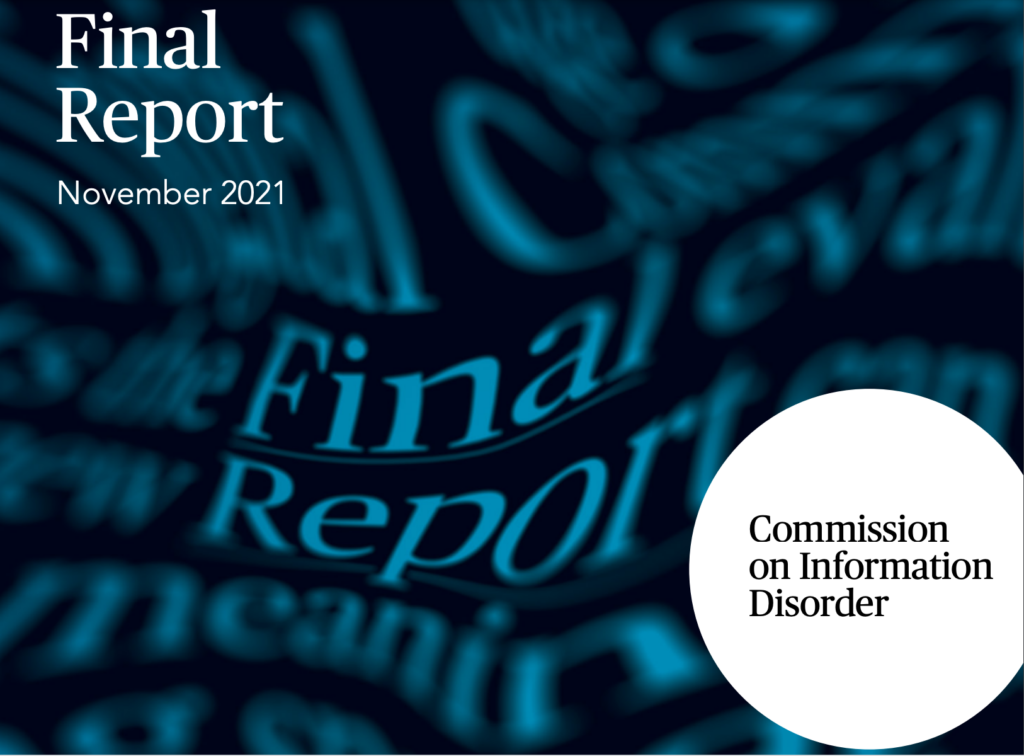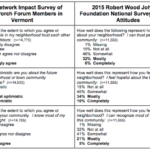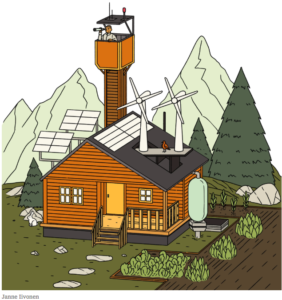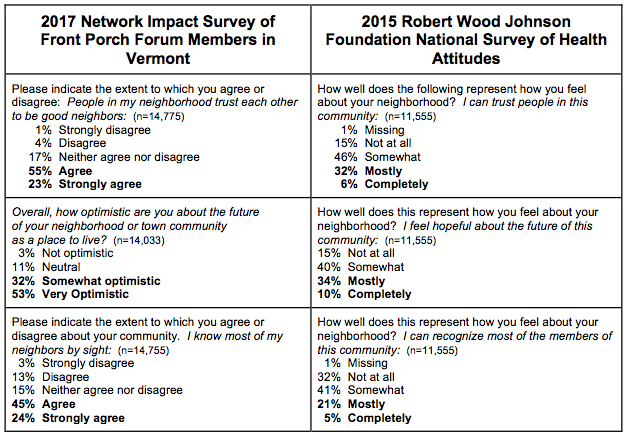Search Results for: "scale"
Healthy Digital Discourse
The Aspen Institute just issued its Commission for Information Disorder final report. We’re humbled to see Front Porch Forum recognized among a short list of approaches that are making real progress instead of feeding the spread of disinformation. The commission includes celebrities like Craig Newmark, Katie Couric and Prince Harry, along with an array of national experts.

FPF was held as an example of how to
“Develop and scale communication tools, networks, and platforms that are designed to bridge divides, build empathy, and strengthen trust among communities.“
Healthy Social Media? Experts Weigh In
Vermont’s own example of “Small Tech,” Front Porch Forum, drew several mentions this past week as the antithesis of Facebook and other destructive Big Tech.
Michelle Goldberg stated in the New York Times:
“Deb Roy, director of the M.I.T. Center for Constructive Communication and former chief media scientist at Twitter,… believes that the potential for a healthy social media exists — he points to Front Porch Forum, the heavily moderated, highly localized platform for people who live in Vermont. But it’s notable that his best example is something so small, quirky and relatively low-tech. Sure, there are ways of communicating over the internet that don’t promote animosity, but probably not with the platforms that are now dominant.“
While Jason Kelley and Danny O’Brien at the Electronic Frontier Foundation shared…
“[FPF] users say that while most of the internet ‘is like a fire hose of information and communication, Front Porch Forum is like slow drip irrigation.’ While many of the most popular social networks need to scale to perform for investors, which relies on moving fast and breaking things, Front Porch Forum could be described as a site for moving slowly and fixing things.”
And civic tech expert Micah Sifry said in his SubStack newsletter The Connector…
“Ian Bogost makes a good argument in The Atlantic for legislators or regulators setting speed and volume limits on sites like Facebook. Getting the tuning right won’t be simple, but in the same way that we’ve come up with safety rules for all kinds of products, we need them for social media. I’d start by looking at what has worked for a platform like Front Porch Forum, and try limiting the size of people’s ‘friend’ lists and the speed of comments.”
“The Internet’s Missing Link in the Age of COVID-19”
COVID-19 is forcing everyone to adapt. An essential part of that adaptation is the use of technology to keep people connected without the face-to-face risk factors the coronavirus presents. Micah Sifry of Civic Hall observes the many challenges we all face as we navigate a global pandemic and the tech solutions that may help us move forward.
Sifry identifies Front Porch Forum as digital public infrastructure that can help communities thrive. See the excerpt below.
“In all my years of reporting on how we use tech in civic life, one platform has stood out for how it has successfully fostered healthy community engagement while reaching significant scale: Vermont’s Front Porch Forum. Seventy percent of the state’s 260,000 households have an account on one of FPF’s local town or neighborhood forums, which are in every part of the rural state. Two years ago, the Robert Wood Johnson Foundation released an in-depth study of FPF’s users, finding that their daily use of the site led to increased trust in their neighbors, increased interest in civic life, greater participation in local government, and increased optimism about the future. ‘Witnessing everyday acts of neighborliness is a powerful driver of both online and offline community engagement,’ the study concluded.
Last week, I checked in with its founder Michael Wood-Lewis and his chief innovation officer, Jason Van Driesche, to find out how they are weathering the current storm. After a brief dip in the site’s fortunes when the state went into lockdown in March, they were happy to report that even though no one was posting yard sales or local events, the type of information that has always been FPF’s bread-and-butter, user engagement was up. The number of net new signups per day doubled during the first weeks of the crisis, and posting is up considerably over the seasonable average, along with open rates.
Wood-Lewis and Van Driesche are also gratified to report that people are using the forum’s daily email bulletins to organize help for neighbors, share vital public health information, and fight isolation. They’ve decided to have their paid community moderators screen out misinformation about COVID, which Wood-Lewis said is ‘usually people getting stuff off of Facebook and sharing it with good intentions.’ They’re working on an array of service improvements, and also thinking hard about how to support the 10,000 local businesses, thousands of local officials and hundreds of nonprofits that use the site. ‘On a daily basis, most of the people in our state are giving us five to ten minutes of their attention,’ Wood-Lewis noted. But he and his team are frustrated that so much of FPF’s core mission, which is to bring neighbors together face-to-face, is stymied by the pandemic. ‘We know we’re successful when those real in-person things happen,’ he adds, so his team is trying to highlight local initiatives like safe scavenger hunts for kids and community claps for frontline workers.
Front Porch Forum’s model works because it keeps its forums to human size and speed, and it has paid moderators perusing every post before they reach subscribers. A typical instance has 500 to 1,000 people on it, all from the same town or neighborhood, and all verified, using their real names. Everyone sees the same content at the same time, Van Driesche pointed out; there’s no microtargeting of content. So while people still are people, and they may post things that get on their neighbors’ nerves, the general tenor of the site is ‘let’s pull together instead of knocking each other down.‘”
Read the full article here.
VT Benefit Corp Seeking Full-Stack Developer
:format(webp):no_upscale()/cdn.vox-cdn.com/uploads/chorus_asset/file/10310405/akrales_171211_2179_0393.jpg) Front Porch Forum is seeking an Intermediate or Senior-level Developer to join our team. The position is full-time and based in Burlington (remote optional). Be part of a world-class team of engineers. Help us fulfill our community-building mission.
Front Porch Forum is seeking an Intermediate or Senior-level Developer to join our team. The position is full-time and based in Burlington (remote optional). Be part of a world-class team of engineers. Help us fulfill our community-building mission.
Poll: Two-thirds of Americans want to break up companies like Amazon and Google
Interesting article by Vox today. Some key take-aways…
Fighting Online Bullying
From Micah Sifry in Civicist 1st Post today
Katy Steinmetz reports for Time magazine on how Instagram is trying to use AI to reduce how much the platform is used for cyberbullying, but as she notes, “it’s much easier to recognize when someone in a photo is not wearing pants than it is to recognize the broad array of behavior that might be considered bullying.” Oh, and the person in charge of this whole effort, Adam Mosseri, previously was in charge of the development of Facebook NewsFeed, so this should inspire confidence. (How does your AI read sarcasm, he asked.)
 One problem with Steinmetz’s article is that she accepts the frame of all the blitzscaled platforms, which is that connecting the entire world online requires massively open platforms, unfortunately creating massive toxic effects. But cyberbullying isn’t, as Steinmetz writes, “a problem that crops up anywhere the people congregate online.” It’s a problem that crops up wherever a platform has been optimized for engagement over any other value, and where there is limited to no human moderation. For example, a user of Front Porch Forum in Vermont, where each instance is centered on a neighborhood of roughly 1000 households and a paid part-time moderator helps keep the conversation civil, does not experience cyberbullying, as a recent study found.
One problem with Steinmetz’s article is that she accepts the frame of all the blitzscaled platforms, which is that connecting the entire world online requires massively open platforms, unfortunately creating massive toxic effects. But cyberbullying isn’t, as Steinmetz writes, “a problem that crops up anywhere the people congregate online.” It’s a problem that crops up wherever a platform has been optimized for engagement over any other value, and where there is limited to no human moderation. For example, a user of Front Porch Forum in Vermont, where each instance is centered on a neighborhood of roughly 1000 households and a paid part-time moderator helps keep the conversation civil, does not experience cyberbullying, as a recent study found.
More Neighborly Communities
Front Porch Forum members report closer-knit communities.
 “We live in a world in which we need to share responsibility. It’s easy to say “˜It’s not my child, not my community, not my world, not my problem.’ Then there are those who see the need and respond. I consider those people my heroes.” “• Fred Rogers of Mr. Roger’s Neighborhood
“We live in a world in which we need to share responsibility. It’s easy to say “˜It’s not my child, not my community, not my world, not my problem.’ Then there are those who see the need and respond. I consider those people my heroes.” “• Fred Rogers of Mr. Roger’s Neighborhood
Lynn A. of Montpelier, Vt. says “Front Porch Forum: discovering Vermont’s neighborly spirit, one glorious post at a time.”
FPF members report knowing and trusting more of their neighbors than national averages, resulting in closer-knit communities. Neighbors who know each other are more likely to lend a hand in times of need, whether it be loaning a pressure canner, larger-scaled community projects like organizing a foodbank, or emergency efforts.
FPF co-founder Michael Wood-Lewis shares that “when neighbors know each other and offer help or advice among each other, social capital accrues. FPF fosters real connections throughout networks of neighbors, and those ties bring genuine value to a community. Why buy a new ladder when you can borrow one from a neighbor?”
Front Porch Forum is a place where folks can learn their neighbors’ names and share hopes for the community and perspectives on local issues. The forum enables participants to familiarize and become informed online so that they can get out and have face-to-face discussions and take action offline. The result: optimism, unity, trust, and helping one another.
Stephanie Teleen, Neighbors Day VT organizer, uses Front Porch Forum to get the word out. She says “there are a few things you can count on in Vermont: beautiful scenery, ample snow, and Front Porch Forum. When Vermont became the first state in the country to celebrate Neighbor’s Day on June 2, 2018, FPF was the first and only statewide organization to help promote this event. Why? Because FPF knows the value of personal connection and communication within our communities. Neighbors Day happens once a year, but FPF works to connect neighbors every day, all year long. FPF is like a digital potluck with no cooking required! Being neighborly is paid forward in Vermont… to everyone’s benefit..”
*The Robert Wood Johnson Foundation funded an independent third-party, Network Impact, to design, implement and analyze an online survey of 132,188 Front Porch Forum members in March 2017. 13,086 Vermonters completed this 20-minute survey. With a 99% confidence level, the survey results represent the full FPF membership.
**2015 Robert Wood Johnson Foundation National Survey of Health Attitudes
Investing in climate change insurance? Try community resiliency
A recent article in New York Times… 
Climate Change Insurance: Buy Land Somewhere Else
In case global warming makes their homes uninhabitable, some millennials have a Plan B: investing in places like the Catskills, Oregon and Vermont.
Buried among several examples of people who think the answer to large-scale catastrophe is striking out on their own is the following gem…
Bruce Riordan, program director for the Climate Readiness Institute at the University of California Berkeley, cautioned that it isn’t realistic to expect to live in a bubble. “Sure, you can grow your own vegetables, but what about wheat and grains?” he said. “And what happens when you need medical attention?”
Mastering surgery would certainly be a lot harder than learning to grow tomatoes.
A better strategy, Mr. Riordan suggested, would be to find a community that is intelligently preparing for whatever climate change may bring. He equated the situation to what California has done about earthquakes: They can’t be avoided, but we can build safer buildings, get better at predicting them and establish systems to care for vulnerable populations when they occur.
This jibes with Front Porch Forum‘s experience. When disaster strikes, the most resilient communities are those full of neighbors who know each other, know what’s going on, and who have a record of helping each other and accomplishing things together.
New survey in Vermont reveals more trust among neighbors
Tapping 145,000 Front Porch Forum members across Vermont, a recent independent, large-scale survey revealed that FPF members know and trust their neighbors at double national averages. They also have more hope for the future of their local communities. More than 15,000 FPF members across Vermont responded to the survey.
78% of survey respondents say that their neighbors trust each other vs. 38% of Americans that say they trust their neighbors.
“It makes you proud to live in a place with such a strong sense of community.” • John in Panton
The new survey, conducted by Network Impact and supported by the Robert Wood Johnson Foundation, also found a similar pattern when asking related questions:
85% of survey respondents in Vermont are optimistic about the community where they live vs. 44% of Americans who feel hopeful about the future of their neighborhoods.
69% of survey respondents in Vermont know most of their neighbors vs. 26% of Americans who can recognize most of their neighbors.
“The recent survey shows that 89% of respondents say their neighbors help others, and 79% say that their neighbors pitch in on community projects. Being neighborly is paid forward in Vermont… to everyone’s benefit.” • Michael Wood-Lewis, Co-Founder and CEO of Front Porch Forum

This survey was commissioned by the Robert Wood Johnson Foundation and Front Porch Forum, and conducted by Network Impact. More than 15,000 FPF members (out of 132,000 surveyed) across Vermont responded in March 2017, yielding a 99% confidence level in the results. See here for Network Impact’s report about their survey.
About Blog
Ghost of Midnight is an online journal about fostering community within neighborhoods, with a special focus on Front Porch Forum (FPF). My wife, Valerie, and I founded FPF in 2006... read more
Post Categories
- Uncategorized
- PDF2009
- Calendar
- Northeast Kingdom
- podcast
- Peer Rental
- Localization
- Big Tech
- Events
- PDF2007
- Web Traffic
- Google AdSense
- Pay It Forward
- Elections
- berkmansunlight
- Maps
- Video
- Upstate New York
- Coupons
- Wildlife
- Mobile
- Viral Marketing
- Raffle
- Crisis Response
- Donations
- Lost & Found
- Gratitude
- Real Estate
- College Students
- Social Responsibility
- Orton Family Foundation
- Start ups
- Best of FPF
- Make It Your Own Awards
- Online Civility
- Clay Shirky
- Newspapers
- How To Use FPF
- Humor
- Online Classified Ads
- Peer Reviews
- Politics
- Community Management
- Economic Development
- Local Reviews
- Case Foundation
- Borrow and Lend
- Neighborhood Watch
- Good Government
- Small Business Advertising
- Citizen Journalism
- e-Vermont
- Democracy
- Local Search
- Knight Foundation
- Burlington
- MacArthur Fellows
- Civic Engagement
- Social Media
- social capital
- Social Networking
- Vermont
- Neighborhood
- Community Building
- Local Online
- Front Porch Forum

 “Something amazing happened to us tonight. We went out to dinner to celebrate our 51st wedding anniversary.
“Something amazing happened to us tonight. We went out to dinner to celebrate our 51st wedding anniversary. :format(webp):no_upscale()/cdn.vox-cdn.com/uploads/chorus_asset/file/19211150/GBcuR_breaking_up_big_tech_future_competition_2_.png)
:format(webp):no_upscale()/cdn.vox-cdn.com/uploads/chorus_asset/file/19211154/nLNsi_breaking_up_big_tech_content_2_.png)